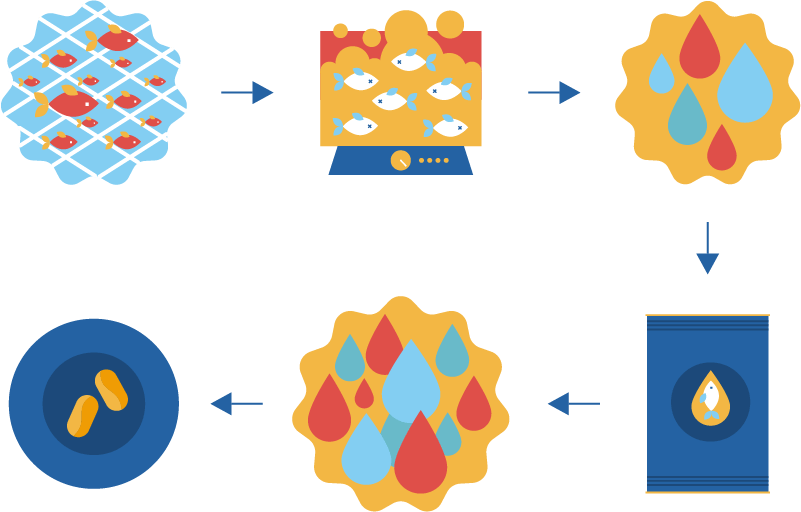Table of Contents
Have you ever wondered how fish oil is made? It's a staple in many health-conscious individual's routines, but its journey from the ocean to the store shelf is intriguing. While many health trends come and go, fish oil pills remain consistently popular.
In some ways, this fish oil craze makes sense. Fish oil is hailed for its rich content of EPA and DHA, two essential omega-3 fatty acids. These nutrients are known to lower high blood pressure, boost brain health, and combat inflammation. Yet, despite their benefits, many don't consume enough fish, making supplements a popular alternative.*
But as with many industries, there's a hidden side to fish oil production. So, how is fish oil made, and are there more sustainable options?
How Did Fish Oil Become So Popular?
Fish have always been valued in our diet. Ancient Romans, for instance, consumed crude fish oil, believing it had medicinal properties. Back then, people made a crude fish oil supplement that was thought to have various medicinal properties, from fighting off headaches to acting as an aphrodisiac!
Fast-forwarding through time to the 1970s, researchers became interested in fish's specific roles in heart health after studying native Inuit people. Even though their diets were high in fatty seafood like cold-water fish, the Inuit were less likely to have heart attacks. Despite how contradictory it sounded then, it turned out that the high omega-3 fatty acids EPA and DHA levels from their diet were likely the reason.
Because of this discovery and several other studies on the subject matter, we can now conclude that omega-3 fatty acids are essential nutrients that help protect our hearts, brains, and overall health.
Until recently, cold-water, oily fish were thought to be the best source for EPA and DHA. However, many people don’t get enough fish to capitalize on those health benefits. So, the fish oil supplement industry began boiling fish down and processing the resulting oil into convenient little capsules.
Here’s Why The Fish Oil Industry Is A Problem Now.
Poor diet quality and lifestyle choices have become common, leading to an upswing in chronic diseases like Type 2 Diabetes and heart disease. With all the reported health benefits associated with eating a diet rich in omega-3 fatty acids, fish oil supplements have risen to the top as one of the most commonly taken dietary supplements for adults and children.
While omega-3s are essential, the surging demand for fish oil pills is harming our planet. These aren’t ‘miracle pills,’ and the environmental consequences of their production are alarming.
How Is Fish Oil Made?
If you follow the process of fish oil production from the oceans to your medicine cabinet, you’ll find that it’s a long and far-reaching process – and it’s fishy in more ways than one.
Let’s break it down:
- Oily, cold-water fish are caught from the ocean.
- The oils are extracted from the fish using various methods, from boiling them down to applying chemical solvents like chloroform and methanol.
- The extracted oils are then shipped off to other places worldwide to be refined.
- The oils are refined via several chemical processes, including bleaching, degumming, deodorizing, and deacidification.
- The refined oils are then put into capsules, packaged, and shipped off again.
- The finished products make it to your local store to sit on shelves until bought.
The Pitfalls of Fish Oil Production
This wide-spanning process is terrible for two reasons: it compromises the quality of the final product, and it contributes to the depletion of our natural resources.
First, let’s start with why it’s bad for you, the consumer. You likely add fish oil soft gels to your daily routine to avoid a nutrient deficiency. However, the final product might be less effective than you’d think.
- There are a ton of steps involved in the reduction and processing of fish oil. Unfortunately, each of these steps can compromise fish oil quality since fats are particularly prone to chemical instability. The longer the process takes, the more your fish oil supplements are at risk of having their quality compromised.
- Did you know that your fish oil supplements can go bad? Unlike other commercial supplements, fish oil is especially susceptible to oxidation, which eventually leads to rancidity.
The oxidation process already happens naturally due to the nature of fatty acids. However, all those extraction and refining techniques used in the process can affect different oil properties and increase susceptibility to oxidation.
Oxidation doesn’t just change the taste, either; it can harm your health and negate the health benefits. Depending on the processes used to extract and refine the oil and how long it takes to reach your home, you might be dealing with a stinky and rotten supplement that could cause inflammation rather than fighting it.
- The main reason you would even add these capsules to your diet is to supplement your intake of omega-3 fatty acids. All those processes between the fish being caught and the pills making it into your system can also change the final product’s omega-3 fatty acid content. In other words, the health benefits of fish oil omega-3s may not be the same as the benefits you would get from eating fresh fish.
An even more pressing problem can be found when looking at how badly this process negatively impacts our environment.
Overfishing
Overfishing is a substantial contributing factor to the destruction of the oceans. It depletes the seas of their natural resources and disrupts aquatic food chains. This environmental impact occurs no matter what fish are used in the process. The reduction industry, which boils fish down to separate them into fish oil and fishmeal, targets smaller fish, and taking these out of their food chains can have consequences that trickle all the way up.
It’s also an unsustainable practice, especially considering how much fish oil demand is rising. Scientists have already found that fisheries are facing a severe crisis trying to keep up with the global fish demand. As more people look to add fish oil supplements into their daily routine, more fishing will have to be done, and these aquatic food chains will experience more disruptions.
Fish Farming
You might think that getting fish from a different source might be better, but farmed fishing doesn’t help either – in fact, some scientists believe that farmed fishing actually adds to the problem since feeding farmed fish requires a lot of smaller fish.
Fish farms are also thought to contribute to environmental damage. If they are near oceans, they risk having the drugged and/or diseased farmed fish escape and contaminate wild populations of fish, and they can also spread pollution.
Carbon Footprint
The fish oil production process also has a considerable carbon footprint.
All that transportation between stages requires fuel and carbon emissions. When crude products are shipped to places worldwide multiple times for the various processes involved in turning whole fish into an oil capsule, it comes at huge transportation and energy costs.
Some scientists believe it is not worth taking fish oil supplements because it poses many risks to consumers and the environment.
Algae Oil as the Omega-3 Revolution
For all the problems that fish oil supplements present, it’s easy to forget that omega-3 fatty acids are still essential to your diet. But they are, and the answer is simple: get your omega-3 fatty acids from a better source instead!
Fish oil is not the only source for DHA and EPA. The rise of sustainable vegan alternatives made from algae oil has changed the omega-3 fatty acid game. You no longer have to eat fish or their easily-compromised fish oil products to have a balanced diet.
Algae oil is the primary producer of EPA and DHA in the fish food chain, so you can get these essential fatty acids directly from the source without extracting them from ocean fish.
You’ll also lessen your environmental impact by using algae oil supplements instead. These plant-based sources can be isolated and grown indoors without interfering with aquatic food chains. Plus, the fatty acids in algae oil supplements are just as bioavailable as the ones you would get from whole fish!
Improving your health doesn’t have to come at the cost of funding a dirty industry.




 You might think that getting fish from a different source might be better, but farmed fishing doesn’t help either – in fact, some
You might think that getting fish from a different source might be better, but farmed fishing doesn’t help either – in fact, some  The fish oil production process also has a considerable carbon footprint.
The fish oil production process also has a considerable carbon footprint.